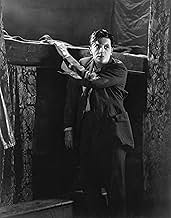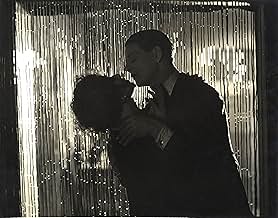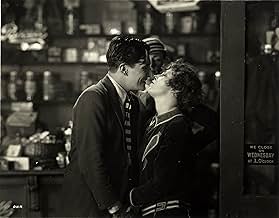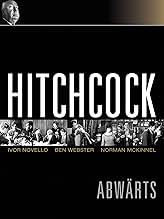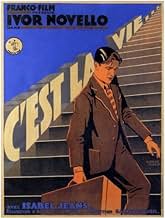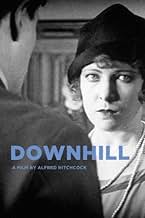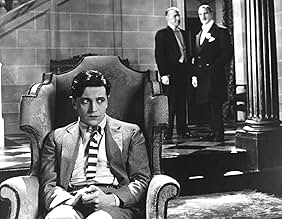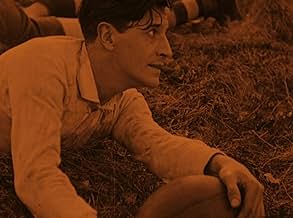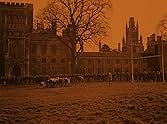AVALIAÇÃO DA IMDb
6,0/10
3,3 mil
SUA AVALIAÇÃO
Adicionar um enredo no seu idiomaBound by honor, a successful schoolboy takes the blame for his roommate's indiscretion, and it's all downhill from there.Bound by honor, a successful schoolboy takes the blame for his roommate's indiscretion, and it's all downhill from there.Bound by honor, a successful schoolboy takes the blame for his roommate's indiscretion, and it's all downhill from there.
- Direção
- Roteiristas
- Artistas
Constance Collier
- Dance Hall Lady with Purse
- (não creditado)
Daisy Jackson
- The Seductive Waitress
- (não creditado)
Avaliações em destaque
My copy of this movie is truly silence with no musical score. Whenever I watch a movie that is completely silent, initially I find it a little hard. But when the film is well made, as this one is, it doesn't take long to adjust and focus on the story as you are drawn into it. I feel Hitchcock was a master of the silent film genre with his ability to tell such a deep story with very few intertitles. Relying instead on the expressions of the actors and written notes and signs in the movie, without having to cut away to an intertitle, which allows the film to flow more fluidly instead of constant cutting between the live action and the title cards. Ivor Novello in the lead role of Roddy and in his prior work with Hitchcock in The Lodger really impressed me with his talent of conveying his feelings strictly through facial expressions and acting without the use of sound. Hitch is also good at using subtle exaggeration and focus on action to help take the place of the sound in his silent films.
The story is that of a young man in school who is falsely accused of theft by a lady that he had danced with and he is willing to take the blame for a friend of his and is expelled from school. This leads to the downhill spiral of his life as leaves home after his father calls him a "LIAR!". Things get worse from there as ends up working as a gigolo in Paris, getting in fights, losing a large sum of money, and eventually hitting bottom.
In this film we really begin seeing a lot of Hitchcock's visual style that he is so famous for. He has some really good use of fades and graphic matches between scenes. Two of my favorite where the fading out on the pocket watch and into a large clock, and the other being the scene where he fades out on a photograph and then back in on the real person. I really enjoyed the symbolic shot of Roddy heading down the escalator, showing us that is in heading downhill in his life. And my favorite "Hitch" shot in this movie was the point-of-view shot when the lady was leaning back in her chair and it cuts to Roddy walking into the room and we see him upside down on the screen. I also thought Hitchcock did a great job of portraying Roddy's seasickness towards the end of the film. I really enjoy seeing Hitchcock's style developing in his early silent films, that will become so prominent in his later, more famous movies. I also really appreciate Hitch's working in comedic scenes into his serious movies. My favorite humorous scene in this movie is the peashooter scene early in the film.
Without giving too much away, I would have liked to see a more typical Hitchcock ending to this film.
*** (out of 4 stars)
The story is that of a young man in school who is falsely accused of theft by a lady that he had danced with and he is willing to take the blame for a friend of his and is expelled from school. This leads to the downhill spiral of his life as leaves home after his father calls him a "LIAR!". Things get worse from there as ends up working as a gigolo in Paris, getting in fights, losing a large sum of money, and eventually hitting bottom.
In this film we really begin seeing a lot of Hitchcock's visual style that he is so famous for. He has some really good use of fades and graphic matches between scenes. Two of my favorite where the fading out on the pocket watch and into a large clock, and the other being the scene where he fades out on a photograph and then back in on the real person. I really enjoyed the symbolic shot of Roddy heading down the escalator, showing us that is in heading downhill in his life. And my favorite "Hitch" shot in this movie was the point-of-view shot when the lady was leaning back in her chair and it cuts to Roddy walking into the room and we see him upside down on the screen. I also thought Hitchcock did a great job of portraying Roddy's seasickness towards the end of the film. I really enjoy seeing Hitchcock's style developing in his early silent films, that will become so prominent in his later, more famous movies. I also really appreciate Hitch's working in comedic scenes into his serious movies. My favorite humorous scene in this movie is the peashooter scene early in the film.
Without giving too much away, I would have liked to see a more typical Hitchcock ending to this film.
*** (out of 4 stars)
'Downhill' is visually inventive and astonishing, but the story is nothing more than simple flat melodrama. Script is based on the play "Down Hill" written by Constance Collier and the film's star Ivor Novello. Roddy Berwick (Ivor Novello) and Tim Wakely (Robin Irvine) are best buddies attending expensive private school. Soon after both boys spend an evening with waitress (Annette Benson), she comes forward and says she's pregnant. She accuses Roddy, who comes from the rich family, being the father, while the real one is Tim. Roddy promises to keep his mouth to protect Tim, who might lose his scholarship. Roddy gets expelled from school, and thrown out at home by his father. Roddy falls deeper and deeper after being used by different people. Hitchcock fantastically depicts Roddy's descent after each dramatic episode with showing Novello's character going down on stairs, on escalators and with elevator.
Not the Hitchcock's best movie - directing is marvelous, but the story is just too simple and predictable. On the other hand, it is very easy to care about the main character and despise the cruel people who but other persons through unfair grind (even when things happen thanks to Roddy's own naivety).
P.S. At that time (in August, 2018) the film's theme is still relative.
Not the Hitchcock's best movie - directing is marvelous, but the story is just too simple and predictable. On the other hand, it is very easy to care about the main character and despise the cruel people who but other persons through unfair grind (even when things happen thanks to Roddy's own naivety).
P.S. At that time (in August, 2018) the film's theme is still relative.
Silent film directed by Alfred Hitchcock about a wealthy young man named Roddy (Ivor Novello) who takes the blame for a friend's indiscretions with a tramp and finds his whole life unraveling because of it. Not entirely successful, with a yawner of an ending, but worth a look for Novello's performance and glimpses of Hitchcock's emerging style. Tenth-billed Ian Hunter plays a small role as an actor who helps rip Roddy off. The whole thing is filmed in sepia tone except for a section in green, the reason behind which is actually fairly clever. Watch and I'm sure you'll figure it out. It's a decent picture but it goes on too long. Lost my interest well before the disappointing ending. Still, give it a go and form your own opinion. Even a lesser Hitchcock film is worth seeing.
I just watched this film which I purchased on Ebay. I am a fan of Ivor Novello primarily because of his operatic musicals of the thirties and forties. I saw The Lodger recently and was impressed with his performance, read a biography or two, enjoyed Jeremy Northam's portrayal in Gosford Park, and am hunting for other performances in the cinema. This movie is very well done and adds an interesting insight into Hitchcock's early career. The quality of the acting, photography, use of symbolism are undeniable. I thought the impression that women are a bit dangerous was a major point but at least his mother cared about him although she didn't seem to resist his father's impulsive banishment. This is a film which held my interest throughout and I highly recommend it.
Classmates and close friends at an English public school, Roddy Berwick and Tim Wakely compete for the affections of a local shop girl. When the girl falsely accuses Roddy of getting her pregnant, he is expelled. However, Roddy remains silent to protect Tim, who was the guilty party, and the friends make a pact to keep silent. Outraged at his expulsion, Roddy's father does not believe his son's claims of innocence and throws him out. Thus, Roddy strikes out on his own, and his life begins a downward spiral from stage acting to a disastrous marriage to taxi dancing to the Marseilles waterfront. "When Boys Leave," also known as "Downhill," was Alfred Hitchcock's fifth completed film, and, early on in his career, the master director explores his oft-repeated theme of the wrongfully accused.
Shot in 1927, the film is silent with inter-titles, and the black-and-white cinematography is often well lit with striking visual compositions. However, Hitchcock generally holds the camera steady, and movement occurs within the frame. The film lacks the camera fluidity common among movies of the late silent era, although Hitchcock is already a master of visual story-telling, and the inter-titles are brief and sparse. As Roddy's life reels out of control, he is dwarfed by his surroundings in rooms with impossibly high ceilings and doors that are more than twice his height. Fortunately, Hitchcock elicits naturalistic performances from his cast, and none indulges in the grand style of acting that negatively stereotyped silent movies. Ivor Novello, a Welsh matinée idol best known for his musical talents, plays the suffering Roddy quite well. Isabel Jeans as Julia Fotheringale, a spendthrift actress, and Ian Hunter as Archie, Julia's shady lover, provide amusing support during one colorful episode in Roddy's descent.
"When Boys Leave" is from Hitchcock's apprentice period in England, when he was still learning the craft. While the story is thin, and the motivations vague, this short silent film shows flashes of the genius to come, and, for students of the master, every Hitchcock film is worthwhile viewing.
Shot in 1927, the film is silent with inter-titles, and the black-and-white cinematography is often well lit with striking visual compositions. However, Hitchcock generally holds the camera steady, and movement occurs within the frame. The film lacks the camera fluidity common among movies of the late silent era, although Hitchcock is already a master of visual story-telling, and the inter-titles are brief and sparse. As Roddy's life reels out of control, he is dwarfed by his surroundings in rooms with impossibly high ceilings and doors that are more than twice his height. Fortunately, Hitchcock elicits naturalistic performances from his cast, and none indulges in the grand style of acting that negatively stereotyped silent movies. Ivor Novello, a Welsh matinée idol best known for his musical talents, plays the suffering Roddy quite well. Isabel Jeans as Julia Fotheringale, a spendthrift actress, and Ian Hunter as Archie, Julia's shady lover, provide amusing support during one colorful episode in Roddy's descent.
"When Boys Leave" is from Hitchcock's apprentice period in England, when he was still learning the craft. While the story is thin, and the motivations vague, this short silent film shows flashes of the genius to come, and, for students of the master, every Hitchcock film is worthwhile viewing.
Você sabia?
- CuriosidadesThe £30,000 Roddy inherits would have equated to about $143,000 at the time (in 1927), and that amount equals over $2.5M in 2023.
- Erros de gravaçãoWhen Roddy and the girl are dancing in the candy shop, a gramophone record of a tune called "I Want Money" is shown. It's on the old "WINNER" label. In a flashback, it's playing again on the record player, but in a further flashback, in a montage, the record has become a "His Master's Voice" disc.
- Citações
[first title card]
Title Card: Here is a tale of two school-boys who made a pact of loyalty. One of them kept it - at a price.
- ConexõesFeatured in Shepperton Babylon (2005)
- Trilhas sonorasI Want Some Money
Words by Herbert Rule & Fred Holt.
Music by L. Silberman.
Played on the gramophone machine by Mabel; even though Downhill is a silent film, the accompanying music would have referenced this song as it underscores elements of the plot.
Principais escolhas
Faça login para avaliar e ver a lista de recomendações personalizadas
Detalhes
Bilheteria
- Faturamento bruto mundial
- US$ 158
- Tempo de duração1 hora 20 minutos
- Cor
- Mixagem de som
- Proporção
- 1.33 : 1
Contribua para esta página
Sugerir uma alteração ou adicionar conteúdo ausente

